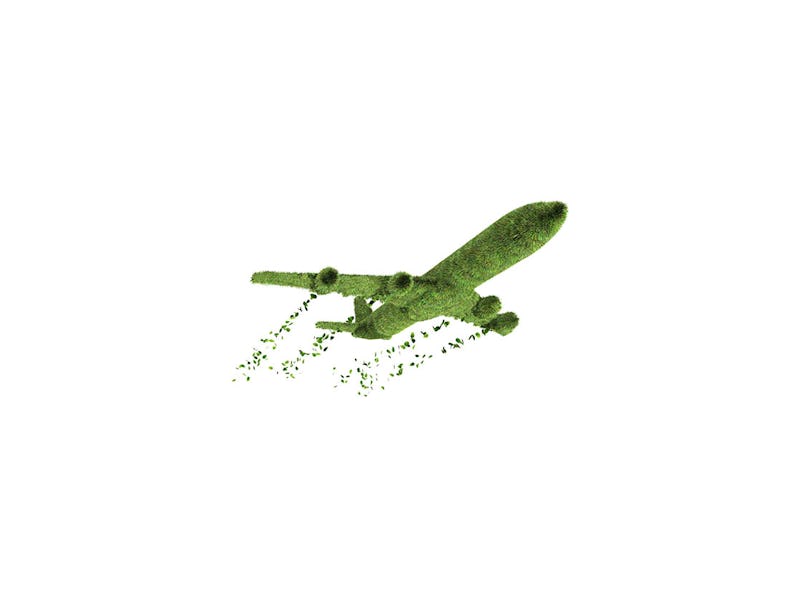Eco-friendly A.I. may solve aviation's biggest problem
With eco-flying, money is still a bigger draw than the environment.

The aviation industry pumped out 915 million tons of CO2 in 2019, accounting for twelve percent of transportation emissions worldwide and two percent of total global emissions -- and those numbers are only rising.
Openairlines, a French data company, says it can transform aviation's bad-boy persona into one that's eco-friendly using smart data optimization, but these efforts may be more about profit than the planet.
What's the news -- Air France announced on Thursday that it was joining the ranks of airlines like Transavia, Malaysia Airlines, Norwegian, Cebu Pacific, flydubai, and Atlas Air in implementing Openairline's "SkyBreathe" system for its flights. This new partnership is in efforts to help Air France slash its emission levels 50 percent (from 2005 levels) by 2030.
Air France also pledged in October 2019 to begin offsetting 100 percent of its domestic emissions in 2020 through actions like planting trees and partnering with global carbon-offsetting projects.
How SkyBreathe works -- Instead of offsetting existing carbon output, SkyBreathe works by helping airline companies reduce their emissions altogether through optimizing big data coming from the planes' black boxes. Using artificial intelligence, this system evaluates hundreds of thousands of data points coming from planes' communications systems, data recorders, and flight plans. By combining this information with real-time data about the flight itself (e.g. what was the weather like,) the system generates an in-depth analysis of how effectively fuel was being used over any given flight.
This information can be easily visualized and presented to pilots to help them improve the efficiency of their flights by suggesting actionable changes, for example reducing acceleration altitude or better controlling when the engine is cut off during touch down.
The original SkyBreathe system is designed to provide these insights after a flight has been completed, but Openairlines also offers a live-version of this software called SkyBreathe On-Board. Using the same type of analysis as the static version, SkyBreathe On-Board provides real-time analysis and suggestions to pilots for improving fuel usage.
By tracking all parts of a plane's flight, SkyBreathe can make suggestions for fuel efficiency improvements.
By following these suggestions, Openairlines says that airlines can expect to reduce their fuel usage by two to five percent. In 2019, Openairlines reports that its customers saved more than $150 million and reduced their fuel usage by 590,000 tons of CO2.
Is it enough -- SkyBreathe offers airlines a way to save money while marketing themselves as eco-friendly -- what's not to love? Well, when comparing the monetary savings produced through these systems to the environmental savings, the ratio is far from even.
Assuming the total emissions from aviation are 915 million tons, then a reduction of 590 thousand is very, very small -- by orders of magnitude. And even when comparing these savings to a single airline's emissions, the value isn't great. JetBlue is estimated to output 8 million tons of CO2 per year, making a savings of 590 thousand only a savings of a little over 13 percent. Not to mention that these 13 percent savings come from the combined fuel reduction of nearly 50 fleets.
Meaning, that implementing these practices on almost 50 individual airlines would still not offset the emissions of a single, non-participating airline.
Eco-friendly flying as a long way to go before it's able to fully off-set its own carbon emissions.
When it comes to monetary savings for the airlines though, the calculus looks much more appealing. Because jet fuel accounts for an estimated 30 percent of airline expenses, Openairlines claims that saving up to five percent of that fuel could result in a savings of "tens of millions of US dollars per year," which is reflected by their 2019 numbers.
Sufficed to say, cost and eco-efficiency are not exactly on the same footing with this software.
The alternatives -- As incomplete as Openairline's approach may be to making true progress toward renewable flights, better options are still hard to come by these days. But that doesn't mean all hope is lost. Battery and biofuel-powered planes are a big area of research right now and airlines, like Air France and Delta, are coming forward under public scrutiny to pledge carbon offsetting for their domestic flights.
While the eco-savings estimated from SkyBreathe may just be a drop in a much bigger bucket, they are at least working to change the culture of airlines and promote more awareness of eco-friendly practices.